NOTE: Many
visitors to this site desire to know basic information about the Beach
Boys, specifically, who is still surviving (Brian Wilson, Mike Love,
and Al Jardine), who has passed on (Dennis Wilson drowned in 1983, Carl
Wilson died from cancer in 1998), and who is now touring (Brian Wilson
tours as a solo artist, Mike Love tours with Bruce Johnston (who joined
the Beach Boys in 1965) as "The Beach Boys") and Al Jardine
occasionally tours with his own band. This page is to give a
brief overview of the Beach Boys lives and careers.
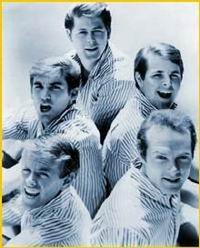 The seminal line-up comprised
Brian Wilson (b. 20 June 1942, Hawthorne, California, USA), Carl Wilson
(b. 21 December 1946, Hawthorne, California, d. 6 February 1998),
Dennis Wilson (b. 4 December 1944, Hawthorne, California, USA, d. 28
December 1983), Al Jardine (b. 3 September 1942, Lima, Ohio, USA) and
Mike Love (b. 15 March 1941, Baldwin Hills, California, USA). When the
aforementioned three brothers, one cousin and a schoolfriend formed a
casual singing group in Hawthorne in 1961, they unconsciously created
one of the longest-running, compulsively fascinating and
bitterly tragic sagas in popular music. As Carl and The Passions, the
Pendletones and Kenny and the Cadets, they rehearsed and played
high-school hops while elder brother Brian began to demonstrate his
songwriting ability. He was already obsessed with harmonics and melody,
and would listen for hours to close-harmony groups, especially the Four
Freshmen and the Hi-Lo's. One of his earliest songs, The seminal line-up comprised
Brian Wilson (b. 20 June 1942, Hawthorne, California, USA), Carl Wilson
(b. 21 December 1946, Hawthorne, California, d. 6 February 1998),
Dennis Wilson (b. 4 December 1944, Hawthorne, California, USA, d. 28
December 1983), Al Jardine (b. 3 September 1942, Lima, Ohio, USA) and
Mike Love (b. 15 March 1941, Baldwin Hills, California, USA). When the
aforementioned three brothers, one cousin and a schoolfriend formed a
casual singing group in Hawthorne in 1961, they unconsciously created
one of the longest-running, compulsively fascinating and
bitterly tragic sagas in popular music. As Carl and The Passions, the
Pendletones and Kenny and the Cadets, they rehearsed and played
high-school hops while elder brother Brian began to demonstrate his
songwriting ability. He was already obsessed with harmonics and melody,
and would listen for hours to close-harmony groups, especially the Four
Freshmen and the Hi-Lo's. One of his earliest songs, 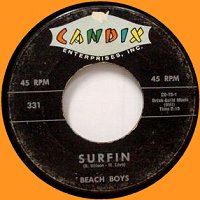 'Surfin''
(written at the suggestion of keen surfing brother Dennis),
was released on a local label, and the topical name 'Beach Boys' was
innocently adopted. The domineering father of the brothers, Murry
Wilson, immediately seized on their potential and appointed
himself as manager, publicist and producer. After his own abortive attempts
at a career in music, he began to live his frustrated career dreams
through his sons. 'Surfin', with Murry's efforts, became a sizeable
local hit, and made the Billboard Hot 100 (number 75). His continuing
efforts gained them a recording contract with Capitol Records during the summer of 1962. In
addition to the developing group's conflicts, Nik Venet (the producer
at Capitol) became embroiled immediately with Murry, and their ideas
clashed. Over the next 18 months the Beach Boys had 10 US hits and
released four albums of surfing and hot-rod songs (each cover showed
the photograph of neighbourhood friend David Marks, who had temporarily
replaced Al Jardine while he attended dentistry college). 'Surfin''
(written at the suggestion of keen surfing brother Dennis),
was released on a local label, and the topical name 'Beach Boys' was
innocently adopted. The domineering father of the brothers, Murry
Wilson, immediately seized on their potential and appointed
himself as manager, publicist and producer. After his own abortive attempts
at a career in music, he began to live his frustrated career dreams
through his sons. 'Surfin', with Murry's efforts, became a sizeable
local hit, and made the Billboard Hot 100 (number 75). His continuing
efforts gained them a recording contract with Capitol Records during the summer of 1962. In
addition to the developing group's conflicts, Nik Venet (the producer
at Capitol) became embroiled immediately with Murry, and their ideas
clashed. Over the next 18 months the Beach Boys had 10 US hits and
released four albums of surfing and hot-rod songs (each cover showed
the photograph of neighbourhood friend David Marks, who had temporarily
replaced Al Jardine while he attended dentistry college).
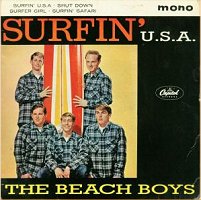 The Beach Boys' punishing workload began to
affect the main songwriter, Brian, who was additionally writing similar
material for fellow surf/hot-rodders Jan and Dean. In 1963 the Beach
Boys phenomenon reached the UK in the shape of the single 'Surfin'
USA', which mildly interrupted the Merseybeat domination. The
predominantly working-class image of the British beat group scene was
at odds with the perception of the clean and wholesome West Coast,
blessed with permanent sunshine, fun, and beautiful girls. The Beach Boys' punishing workload began to
affect the main songwriter, Brian, who was additionally writing similar
material for fellow surf/hot-rodders Jan and Dean. In 1963 the Beach
Boys phenomenon reached the UK in the shape of the single 'Surfin'
USA', which mildly interrupted the Merseybeat domination. The
predominantly working-class image of the British beat group scene was
at odds with the perception of the clean and wholesome West Coast,
blessed with permanent sunshine, fun, and beautiful girls.
During
1964 a further 4 albums were released, culminating in the Christmas Album. This represented a
staggering 8 albums in just over 2 years, 6 of which were arranged and
produced by Brian, in addition to his having written 63 out of a total
of 84 songs. In America, the Beatles had begun their unmatched
domination of the charts, and in their wake came dozens of groups as
the British invasion took place. The Beach Boys, more especially Brian,
could only stand back in amazement. He felt so threatened that it drove
him to compete against the Beatles. Eventually, Brian gained some
pyrrhic revenge, when in 1966 the Beach Boys were voted number 1 group
in the world by the UK music press, pushing the Fab Four into second
place.
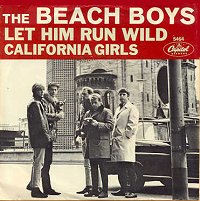 Wilson's maturity as a composer was developing
at a staggering pace with classic hits such as 'I Get Around',
'California Girls' and 'God Only Knows'. The overall quality of albums
such as Summer Days (and Summer
Nights!!)
and Today was extremely high. Many of
Wilson's songs described his own insecurity as an adolescent. Songs
such as 'In My Room', 'Wouldn't It Be Nice' and 'Girl Don't Tell Me'
found a receptive audience who could immediately relate to the lyrics. Wilson's maturity as a composer was developing
at a staggering pace with classic hits such as 'I Get Around',
'California Girls' and 'God Only Knows'. The overall quality of albums
such as Summer Days (and Summer
Nights!!)
and Today was extremely high. Many of
Wilson's songs described his own insecurity as an adolescent. Songs
such as 'In My Room', 'Wouldn't It Be Nice' and 'Girl Don't Tell Me'
found a receptive audience who could immediately relate to the lyrics.
While
the group's instrumental prowess was average, the immaculate
combination of the members' voices delivered a sound that was
unmistakable. Both Carl and Brian had perfect pitch, even
though Brian was deaf in one ear (reputedly caused by his father's
beatings). In private, the 'musical genius' was working on what was to
be his masterpiece, Pet Sounds. Released in August 1966, the
high-profile pre-publicity proved deserved, and the reviews were
outstanding. The music on Pet Sounds was staggering, but for some
inexplicable reason, the album sold poorly compared to previous Beach
Boys releases. It was later reported that Brian was devastated by the
comparative commercial failure of Pet Sounds in his own country (US
number 10), and felt mortified a year later when the Beatles' Sgt.
Pepper's Lonely Hearts Club Band was released.
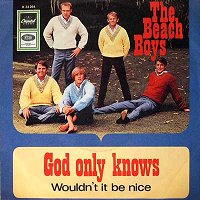 It was not widely known that Brian had already
experienced two nervous breakdowns, retired from performing with the
group and had begun to depend on barbiturates. Even less public was the
breakdown of his relationship with his father and the festering tension
within the band. The brief recruitment of Glen Campbell, followed by
Bruce Johnston, filled Brian's place in public. Through all
this turmoil the Beach Boys rose to their peak at the end of 1966 with
arguably their greatest achievement, 'Good Vibrations'. This glorious
collage of musical patterns, with its changes of tempo, unusual lyrics,
and incredible dynamics, earned Brian and the band the respect of every
musician. It was not widely known that Brian had already
experienced two nervous breakdowns, retired from performing with the
group and had begun to depend on barbiturates. Even less public was the
breakdown of his relationship with his father and the festering tension
within the band. The brief recruitment of Glen Campbell, followed by
Bruce Johnston, filled Brian's place in public. Through all
this turmoil the Beach Boys rose to their peak at the end of 1966 with
arguably their greatest achievement, 'Good Vibrations'. This glorious
collage of musical patterns, with its changes of tempo, unusual lyrics,
and incredible dynamics, earned Brian and the band the respect of every
musician.
The
group embarked on a major tour of Europe with a new single, 'Heroes and
Villains', another innovative excursion with intriguing lyrics by Van
Dyke Parks. Brian, meanwhile, attempted a counter-attack on the
Beatles, with a project to be known as 'Smile' . This became the band's albatross, although it
was never officially released. The painstaking hours spent on this
project now form one of pop's legendary tales. Parts of the material
surfaced on their next three albums, and further tracks appeared on
other collections up until 1971.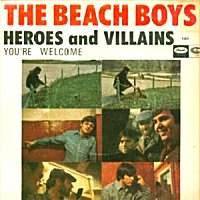
The
conflict between Brian Wilson and the other band members was surfacing
more regularly. Mike Love, in particular, wanted the other Beach Boys
to continue with their immaculate pop music, and argued that Brian was
becoming too far out. Indeed, Brian's reclusive nature, fast-increasing
weight, and growing dependence on drugs added fuel to Love's argument.
Observers felt that the band could not raise themselves to the musical
level visualized in Brian's present state of mind. Smiley Smile in 1967 and Wild Honey the following year were
comparative failures in the charts by previous Beach Boys standards.
Their music had lost its cohesiveness and their mentor and guiding
light had by now retreated to his bed, where he stayed for many years.
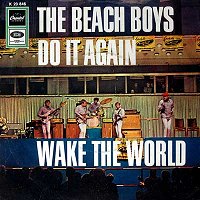 In Europe the group were still having hits, and
even had a surprise UK chart-topper in 1968 with 'Do It Again', with
Love's nasal vocals taking the lead on a song harking back to better
times. Love had by this time become a devotee of the Maharishi Mahesh
Yogi, while Dennis Wilson, who was emerging as a talented songwriter,
became dangerously involved with Charles Manson, later jailed for his
involvement in the murders of nine people between 8 and 10 August 1969.
Dennis was drained of money, parted from his home, and ultimately
threatened with his life by Manson and his followers. Manson and Wilson
collaborated on a number of songs, notably 'Never Learn Not to Love',
which, although a Beach Boys b-side, had the ironic distinction of
putting Charles Manson in the charts. To highlight their discontent, 3
of their next 4 singles were extraneous compositions, namely Bluebirds
over the Mountain', and a competent version of Lead Belly 's
'Cottonfields'. The third non-original was the Phil Spector / Jeff
Barry / Ellie Greenwich opus 'I Can Hear Music', featuring a
passionate lead vocal from Carl, confirming his status as acting
leader. He struggled to maintain this role for many years to come. In
April 1969 the Beach Boys left Capitol in a blaze of litigation. In Europe the group were still having hits, and
even had a surprise UK chart-topper in 1968 with 'Do It Again', with
Love's nasal vocals taking the lead on a song harking back to better
times. Love had by this time become a devotee of the Maharishi Mahesh
Yogi, while Dennis Wilson, who was emerging as a talented songwriter,
became dangerously involved with Charles Manson, later jailed for his
involvement in the murders of nine people between 8 and 10 August 1969.
Dennis was drained of money, parted from his home, and ultimately
threatened with his life by Manson and his followers. Manson and Wilson
collaborated on a number of songs, notably 'Never Learn Not to Love',
which, although a Beach Boys b-side, had the ironic distinction of
putting Charles Manson in the charts. To highlight their discontent, 3
of their next 4 singles were extraneous compositions, namely Bluebirds
over the Mountain', and a competent version of Lead Belly 's
'Cottonfields'. The third non-original was the Phil Spector / Jeff
Barry / Ellie Greenwich opus 'I Can Hear Music', featuring a
passionate lead vocal from Carl, confirming his status as acting
leader. He struggled to maintain this role for many years to come. In
April 1969 the Beach Boys left Capitol in a blaze of litigation. 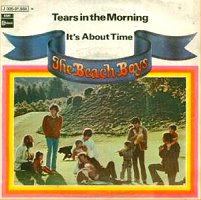 No new product surfaced until August the
following year, apart from 'Add Some Music to Your Day' in March 1970.
They had the ignominy of having an album rejected prior to that. Sunflower was an artistic triumph but a
commercial disaster, on which Dennis contributed four songs including
the sublime 'Forever'. Throughout the subsequent 12 months they set
about rebuilding their credibility in the USA, having lost much ground
to the new-wave bands from San Francisco. They started to tour
constantly, even appearing with unlikely compatriots the Grateful Dead.
Through determination and hard work they did the seemingly impossible
and allied themselves with the hip cognoscenti. No new product surfaced until August the
following year, apart from 'Add Some Music to Your Day' in March 1970.
They had the ignominy of having an album rejected prior to that. Sunflower was an artistic triumph but a
commercial disaster, on which Dennis contributed four songs including
the sublime 'Forever'. Throughout the subsequent 12 months they set
about rebuilding their credibility in the USA, having lost much ground
to the new-wave bands from San Francisco. They started to tour
constantly, even appearing with unlikely compatriots the Grateful Dead.
Through determination and hard work they did the seemingly impossible
and allied themselves with the hip cognoscenti.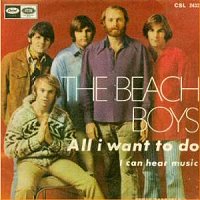
The
arrival of Surf's Up in July 1971 completed their
remarkable renaissance. The title track, with surreal lyrics by Van
Dyke Parks, was another masterpiece, while on the rest of the album it
was Carl's turn to offer strong contributions with the beautiful 'Feel
Flows' and 'Long Promised Road'. The record's strong ecological stance
was years ahead of its time, and the critics were unanimous in
favourably reassessing them. As Dennis co-starred with James Taylor in
the cult road movie Two-Lane Blacktop, so Brian's life was
deteriorating into mental instability.
Miraculously,
the band was able to maintain its career, which at times included only
one Wilson, Carl, and no longer featured the presence of the
long-serving Bruce Johnston. The addition of Ricky Fataar, Blondie
Chaplin, and Daryl Dragon nevertheless gave the depleted band a fuller
sound. One further album appeared before the outstanding 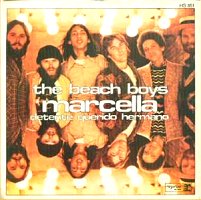 Holland came in 1973. For this project the entire Beach
Boys organization, including wives and children, moved to Holland for
eight months of recording. Thankfully, even Brian was cajoled into
going, and his composition 'Sail on Sailor' was a
high point of the album. Holland came in 1973. For this project the entire Beach
Boys organization, including wives and children, moved to Holland for
eight months of recording. Thankfully, even Brian was cajoled into
going, and his composition 'Sail on Sailor' was a
high point of the album.
Murry
Wilson died of a heart attack in June 1973, but Brian and Dennis
declined to attend the funeral. At the same time, the group's fortunes
were once again in the descendent as a double live album [In Concert] was badly received, but a
year later the compilation Endless Summer, put together by Mike Love,
unexpectedly rocketed to the top of the US charts. It spent 71 weeks on
the lists, disappeared, and returned again the
following year, staying for a further 78 weeks. This unparalleled
success reinforced Love and Jardine's theory that all anybody wanted of
the Beach Boys was surfing and car songs. With the addition
of James William Guercio, formerly of Chicago and ex-producer
of Blood Sweat and Tears, the band enjoyed extraordinary concert tour
success, and ended 1974 being voted 'Band of the Year' by Rolling Stone
magazine. Spirit of America (1975), another compilation of earlier
tracks, enjoyed further success, staying on the American charts for
almost a year.
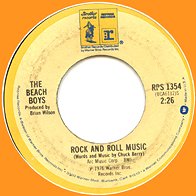 Meanwhile,
Brian's condition had further deteriorated, and he underwent treatment
with controversial therapist Eugene Landy. The album 15 Big Ones, released in July 1976, gave
them a big hit with a cover version of Chuck Berry 's 'Rock and Roll
Music'. The publicity centred on a tasteless 'Brian Is Back' campaign,
the now obese Wilson being unwillingly pushed into the spotlight. It
seemed obvious to all that Brian was a sick, confused, and nervous man
being used as a financial tool. Meanwhile,
Brian's condition had further deteriorated, and he underwent treatment
with controversial therapist Eugene Landy. The album 15 Big Ones, released in July 1976, gave
them a big hit with a cover version of Chuck Berry 's 'Rock and Roll
Music'. The publicity centred on a tasteless 'Brian Is Back' campaign,
the now obese Wilson being unwillingly pushed into the spotlight. It
seemed obvious to all that Brian was a sick, confused, and nervous man
being used as a financial tool.
Subsequent
albums, The Beach Boys Love You and M.I.U. Album, attempted to maintain Brian's
high profile as producer, but close observers were well aware that this
was a complete sham. The material was of average quality, although the
former showed strong glimpses of Wilson's fascination with childlike
innocence. In 1977 they signed a recording contract with CBS reputedly
worth $8,000,000, on the terms that Brian Wilson contributed at least 4
new songs and a total of 70 per cent of all the material for each
album. The first album under this contract was the patchy 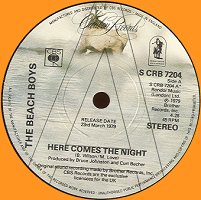 LA (Light Album), with Bruce Johnston recalled
to bail them out on production duties. The album did manage to produce
a sizeable hit with Al Jardine's 'Lady Lynda'. The most controversial
track, however, was a remake of 'Here Comes the Night'; this previously
innocuous R&B song from Wild Honey was turned into an 11-minute
extended disco extravaganza, and alone cost $50,000 to produce. By this
time, Dennis had developed a serious cocaine habit, which hampered the
recording of his own solo album, Pacific Ocean Blue. However, he was rewarded with
excellent reviews, and now openly verbally abused the other members of
the band except for Brian, whom he defended resolutely. When Carl
became addicted to cocaine and alcohol, the fragmentation of the group
was at its height. LA (Light Album), with Bruce Johnston recalled
to bail them out on production duties. The album did manage to produce
a sizeable hit with Al Jardine's 'Lady Lynda'. The most controversial
track, however, was a remake of 'Here Comes the Night'; this previously
innocuous R&B song from Wild Honey was turned into an 11-minute
extended disco extravaganza, and alone cost $50,000 to produce. By this
time, Dennis had developed a serious cocaine habit, which hampered the
recording of his own solo album, Pacific Ocean Blue. However, he was rewarded with
excellent reviews, and now openly verbally abused the other members of
the band except for Brian, whom he defended resolutely. When Carl
became addicted to cocaine and alcohol, the fragmentation of the group
was at its height.
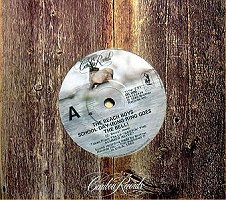 The
next official Beach Boys release was Keeping the Summer Alive, a poor album (with an even
poorer cover), without the presence of Dennis, who had acrimoniously
left the group. He was now living with Christine McVie of Fleetwood
Mac. During 1980 only Love and Jardine were present from the original
group. Carl delivered his first solo album, a beautifully sung,
well-produced record that flopped. One track, 'Heaven', later became a
regular part of the Beach Boys' repertoire and was dedicated to Dennis
during the 80s. In 1982, Brian Wilson was officially
dismissed, and was admitted to hospital for detoxification, weighing a
massive 320 pounds. The
next official Beach Boys release was Keeping the Summer Alive, a poor album (with an even
poorer cover), without the presence of Dennis, who had acrimoniously
left the group. He was now living with Christine McVie of Fleetwood
Mac. During 1980 only Love and Jardine were present from the original
group. Carl delivered his first solo album, a beautifully sung,
well-produced record that flopped. One track, 'Heaven', later became a
regular part of the Beach Boys' repertoire and was dedicated to Dennis
during the 80s. In 1982, Brian Wilson was officially
dismissed, and was admitted to hospital for detoxification, weighing a
massive 320 pounds.
In
December 1983, Dennis Wilson tragically drowned while diving from his
boat. Ironically, his death reportedly snapped Brian out of his stupor,
and he gradually re-emerged to participate onstage. A clean and
healthy-looking band graced the back of the 1985 Steve Levine-produced The Beach Boys. Following this collection
they found themselves without a recording contract, and decided to
concentrate purely on being a major concert attraction, traveling the
world. While no new albums appeared, they concentrated on singles,
including an energetic, well-produced 'Rock and Roll to the Rescue',
followed by their version of the Mamas and the Papas' classic
'California Dreaming', with Roger McGuinn featured on 12-string guitar.
In 1987, they teamed up with rap act the Fat Boys for a remake of the
Surfaris' 'Wipe Out'.
In
1988, a phoenix-like Brian Wilson returned with the solo album that his fans had awaited for
over 20 years. The critics and fans loved it, but the album sold only
moderately well. At the same time, the Beach Boys released 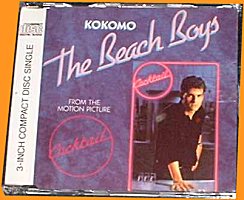 'Kokomo',
which was included in the Tom Cruise film Cocktail, and unexpectedly
found themselves at the top of the US charts for many weeks. In May
1990, the Beach Boys took Brian Wilson to court in an alleged attempt
to wrest his $80 million fortune from him, maintaining that he was
insane and unable to look after himself. His medical condition was
confirmed (extreme introversion, pathological shyness, and manic
depression). Wilson defended the case but reluctantly accepted a
settlement by which he severed his links with Eugene Landy. Wilson was
then officially sacked/resigned and proceeded to recoup monies that had
been pouring in from his back catalogue. Murry Wilson had sold his
son's company, Sea of Tunes, to another publisher in 1969, and during
this latest court case, Wilson testified that he was mentally ill and a
casualty of drug abuse at the time. Wilson won the case and received
substantial back royalties. The dust had barely settled when
Mike Love issued a writ to Brian Wilson claiming he co-wrote 79 songs
with him, including 'California Girls', 'I Get Around,' and 'Surfin'
USA' (the latter was 'borrowed' from Chuck Berry). In 1993 the band
continued to tour, although their show was merely an oldies
package. 'Kokomo',
which was included in the Tom Cruise film Cocktail, and unexpectedly
found themselves at the top of the US charts for many weeks. In May
1990, the Beach Boys took Brian Wilson to court in an alleged attempt
to wrest his $80 million fortune from him, maintaining that he was
insane and unable to look after himself. His medical condition was
confirmed (extreme introversion, pathological shyness, and manic
depression). Wilson defended the case but reluctantly accepted a
settlement by which he severed his links with Eugene Landy. Wilson was
then officially sacked/resigned and proceeded to recoup monies that had
been pouring in from his back catalogue. Murry Wilson had sold his
son's company, Sea of Tunes, to another publisher in 1969, and during
this latest court case, Wilson testified that he was mentally ill and a
casualty of drug abuse at the time. Wilson won the case and received
substantial back royalties. The dust had barely settled when
Mike Love issued a writ to Brian Wilson claiming he co-wrote 79 songs
with him, including 'California Girls', 'I Get Around,' and 'Surfin'
USA' (the latter was 'borrowed' from Chuck Berry). In 1993 the band
continued to tour, although their show was merely an oldies
package.
 During 1994 mutterings were heard that the
pending lawsuit would be settled, as Love and Brian were at least
speaking to each other. Late that year it was announced that a
substantial settlement had been made to Love, effectively confirming
all his claims. In February 1995 a thin, handsome, recently remarried
Wilson and a neat, lively-looking Love met at the latter's home. Not
only had they mended the rift but they were writing songs together.
Early reports indicated both enthusiasm and a desire to make up for
many years of wasted time. Instead they released Stars and Stripes Vol. 1, a lacklustre album of old
Beach Boys songs featuring various country artists on lead
vocals. Wilson's collaboration with songwriter Andy Paley (who co-wrote
material on Brian Wilson) produced several much-hyped tracks, and kindred spirit Sean
O'Hagan from the High Llamas was flown over to co-ordinate the mooted
album. The sessions ended in confusion and discord, however, and no new
material has been forthcoming, with Brian going on to record a second solo album. Carl Wilson began treatment
for cancer in 1997 and, with Al Jardine, decided to take action against
Brian Wilson for statements made in his autobiography. Carl's health
steadily deteriorated, and his death in February 1998 robbed the band
of their sweetest voice. During 1994 mutterings were heard that the
pending lawsuit would be settled, as Love and Brian were at least
speaking to each other. Late that year it was announced that a
substantial settlement had been made to Love, effectively confirming
all his claims. In February 1995 a thin, handsome, recently remarried
Wilson and a neat, lively-looking Love met at the latter's home. Not
only had they mended the rift but they were writing songs together.
Early reports indicated both enthusiasm and a desire to make up for
many years of wasted time. Instead they released Stars and Stripes Vol. 1, a lacklustre album of old
Beach Boys songs featuring various country artists on lead
vocals. Wilson's collaboration with songwriter Andy Paley (who co-wrote
material on Brian Wilson) produced several much-hyped tracks, and kindred spirit Sean
O'Hagan from the High Llamas was flown over to co-ordinate the mooted
album. The sessions ended in confusion and discord, however, and no new
material has been forthcoming, with Brian going on to record a second solo album. Carl Wilson began treatment
for cancer in 1997 and, with Al Jardine, decided to take action against
Brian Wilson for statements made in his autobiography. Carl's health
steadily deteriorated, and his death in February 1998 robbed the band
of their sweetest voice.
With
the forced departure of Alan Jardine from the touring band in 1998, The
Beach Boys, were fractured in all but name only. Mike Love
and Bruce Johnston continues to tour as "The Beach Boys," while Al
Jardine has been forced to tour under various solo monikers, releasing
a fine live CD "Al
Jardine Family & Friends Live in Las Vegas."
Brian Wilson has remarkably moved from strength to strength as a solo
artist, launching several acclaimed tours in the United States
and the UK, most notably his critically-lauded "Pet Sounds Live" shows,
which were later released on CD
and DVD.
In 2004 he is planning to release his next solo album of original
material and will be touring the UK with a first-ever live presentation
of the famous lost album, "Smile," raising fans' expectations that an
archival release of this album will be soon available.
Much
has been written about the band, and to those wishing to study this
institution, David Leaf's book is highly recommended. Timothy
White's recent book adds information that had previously never
surfaced, and is a well-written documentary of California life. Their
career has been rolling, like the tide their great songs evoked,
constantly in and out, reaching incredible highs and extraordinary
troughs. Through all these appalling experiences, however, they still
reign supreme as the most successful American group in pop history.
With the death of Carl Wilson and the continuing absence of Brian, who
is concentrating on his solo career, it would seem unlikely that the
remaining members can continue. The Beach Boys without a Wilson is like
surfing without any waves.
|
